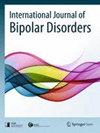Sociodemographic, clinical and treatment characteristics of current rapid-cycling bipolar disorder: a multicenter Chinese study
IF 3.5
2区 医学
Q2 PSYCHIATRY
引用次数: 0
Abstract
Rapid cycling bipolar disorder (RCBD), characterized by four or more episodes per year, is a complex subtype of bipolar disorder (BD) with poorly understood characteristics. This multicenter, observational, longitudinal cohort study enrolled 520 BD patients across seven psychiatric institutions in China from January 2013 to January 2014. Participants were divided into RCBD and non-RCBD (NRCBD) groups based on the frequency of mood episodes in the preceding year. Data collection utilized a standardized form, supplemented by a medical record review, focusing on sociodemographic, clinical, and treatment characteristics. Statistical analysis involved independent samples t-tests, Kruskal–Wallis H tests, Chi-square or Fisher's exact tests, with Bonferroni correction applied to account for multiple comparisons, and multivariable logistic regression to identify characteristics associated with RCBD. Among the BD cohort, 9.4% were identified as current RCBD. Compared to NRCBD, RCBD patients had a shorter duration from the first psychiatric consultation to the diagnosis of BD, a reduced duration of their longest period of euthymia, a lower proportion of lifetime hospitalization history due to BD, and less use of electroconvulsive therapy (ECT) within the last 12 months. Additionally, they presented higher baseline scores on the Mood Disorder Questionnaire (MDQ) and the Brief 16-item Quick Inventory of Depressive Symptomatology Self-Report (QIDS-SR16). However, after applying the Bonferroni correction, these differences were not statistically significant. Multivariable logistic regression analysis identified three factors that were independently associated with RCBD: time from first psychiatric consultation to BD diagnosis (Odds Ratio [OR] = 0.512, P = 0.0416), lifetime hospitalization history due to BD (OR = 0.516, P = 0.0476), and ECT treatment within the past 12 months (OR = 0.293, P = 0.0472). This study revealed that the duration from first psychiatric consultation to BD diagnosis, lifetime hospitalization history due to BD, and ECT treatment in the past year were associated with RCBD. Recognizing these factors could contribute to enhance the early identification and clinical outcomes of RCBD. Trial Registration Number Registry ClinicalTrials.gov NCT01770704. Date of Registration: First posted on January 18, 2013.当前快速周期性躁郁症的社会人口学、临床和治疗特征:一项中国多中心研究
快速周期性双相情感障碍(RCBD)以每年发作四次或四次以上为特征,是双相情感障碍(BD)的一种复杂亚型,其特征尚不十分明确。这项多中心、观察性、纵向队列研究从2013年1月至2014年1月在中国的七家精神病院招募了520名躁狂症患者。根据前一年的情绪发作频率,研究对象被分为RCBD组和非RCBD(NRCBD)组。数据收集采用标准化表格,并辅以病历审查,重点关注社会人口学、临床和治疗特征。统计分析包括独立样本 t 检验、Kruskal-Wallis H 检验、Chi-square 或 Fisher's 精确检验(应用 Bonferroni 校正以考虑多重比较),以及多变量逻辑回归以确定与 RCBD 相关的特征。在 BD 队列中,9.4% 的人被确定为当前 RCBD。与 NRCBD 相比,RCBD 患者从首次精神科就诊到确诊为 BD 的时间较短,最长的优郁期持续时间较短,终生因 BD 住院史的比例较低,在过去 12 个月内使用电休克疗法(ECT)的次数较少。此外,他们在情绪障碍问卷(MDQ)和 16 项抑郁症状快速自评量表(QIDS-SR16)上的基线得分也较高。不过,经过 Bonferroni 校正后,这些差异在统计学上并不显著。多变量逻辑回归分析确定了与 RCBD 独立相关的三个因素:从首次精神科就诊到 BD 诊断的时间(Odds Ratio [OR] = 0.512,P = 0.0416)、终生因 BD 住院史(OR = 0.516,P = 0.0476)和过去 12 个月内接受过 ECT 治疗(OR = 0.293,P = 0.0472)。本研究显示,从首次精神科就诊到确诊为 BD 的持续时间、终生因 BD 住院史和过去一年内接受过 ECT 治疗与 RCBD 相关。认识到这些因素有助于提高RCBD的早期识别率和临床疗效。试验注册号:ClinicalTrials.gov NCT01770704。注册日期:首次发布于 2013 年 1 月 18 日。
本文章由计算机程序翻译,如有差异,请以英文原文为准。
求助全文
约1分钟内获得全文
求助全文
来源期刊

International Journal of Bipolar Disorders
Medicine-Psychiatry and Mental Health
CiteScore
6.70
自引率
5.00%
发文量
26
审稿时长
13 weeks
期刊介绍:
The International Journal of Bipolar Disorders is a peer-reviewed, open access online journal published under the SpringerOpen brand. It publishes contributions from the broad range of clinical, psychological and biological research in bipolar disorders. It is the official journal of the ECNP-ENBREC (European Network of Bipolar Research Expert Centres ) Bipolar Disorders Network, the International Group for the study of Lithium Treated Patients (IGSLi) and the Deutsche Gesellschaft für Bipolare Störungen (DGBS) and invites clinicians and researchers from around the globe to submit original research papers, short research communications, reviews, guidelines, case reports and letters to the editor that help to enhance understanding of bipolar disorders.
 求助内容:
求助内容: 应助结果提醒方式:
应助结果提醒方式:


